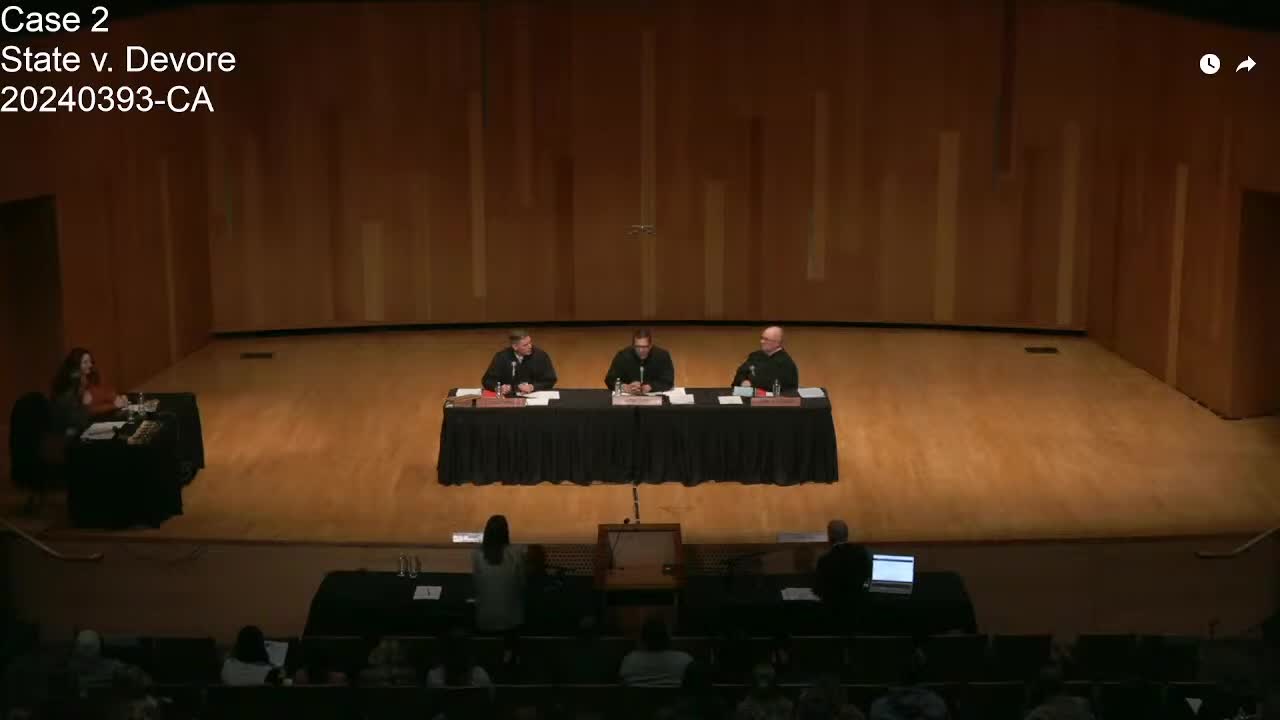Court hears challenge to timing of restitution request and sufficiency of evidence in State v. Devore
Get AI-powered insights, summaries, and transcripts
Subscribe
Summary
In Case No. 20240393, attorneys argued whether the 2023 amendments to Utah's Crime Victim Restitution Act apply to an untimely motion for additional restitution and whether the victim presented sufficient evidence tying later surgery to the defendant's conduct.
The Utah Court of Appeals heard argument in State v. Devore (Case No. 20240393) on whether a post‑sentencing amendment to the Crime Victim Restitution Act (CVRA) governs a request for additional restitution and on the sufficiency of evidence linking the defendant’s conduct to the victim’s later reconstructive surgery. Judge John Luthy presided over the panel that included Judge David N. Mortensen and Judge Ryan Harris.
Appellant counsel Jessica Heidholzer argued the operative event regulated by the restitution statute is the filing of the motion for additional restitution, and that the 2023 version of the CVRA governs that procedural act. Heidholzer urged the court to follow a “procedural‑event” analysis — asking the panel to apply the version of the statute in effect when the restitution motion was filed — and said trial counsel’s failure to raise the statutory‑timeliness argument at the district court was inefficient assistance of counsel.
Michael Palumbo, appearing for the State, replied that Utah precedent points to the version of the CVRA in effect at sentencing and that reasonable trial counsel could conclude sentencing is the controlling event. Palumbo cited Utah Supreme Court decisions, including DeBrock and Blake, arguing that restitution is part of sentencing and that courts have repeatedly treated the sentencing‑time statute as the governing text in similar contexts.
The panel explored distinctions among prior Utah cases, asking whether earlier decisions that anchored the CVRA to sentencing applied where the motion sought ‘‘additional restitution’’ after the court had already entered and the defendant had paid an initial restitution order. Counsel debated whether Blake and DeBrock foreclose the defense argument or whether those precedents leave room for treating statutes that set deadlines and tolling rules as procedural and therefore governed by the version in effect when a party files the motion.
Separately, the court heard argument on whether the State presented sufficient evidence that the victim’s reconstructive surgery was proximately caused by Devore’s conduct. The defense argued the record contained undisputed prior facial injuries and that the victim’s declarations and bills did not adequately account for those earlier events, meaning the State failed to prove proximate cause. The State pointed to medical billing records, an investigator’s review of codes and the victim’s supplemental declaration saying the need for reconstructive surgery resulted from the incident at issue.
After hearing rebuttal and asking follow‑up questions about preservation of arguments below and the consequences of declaring a post‑sentencing restitution order untimely, the panel took the appeal under advisement and said it will issue a written opinion. The judges indicated the outcome could turn on statutory interpretation of the CVRA’s timing provisions and on how prior Utah precedent is applied to motions for additional restitution filed after sentencing.
